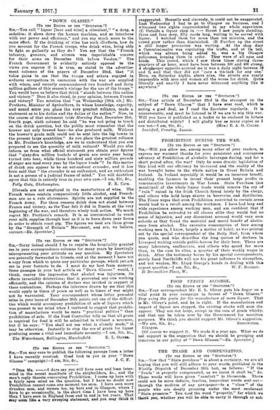PROHIBITION DURING THE WAR.
[To THE EDITOR or THE " SPECTATOR.")
you allow me, among many other of your readers, to express my warmest thanks for your persistent and courageous advocacy of Prohibition of alcoholic beverages during, and for a short period after, the war? Only by some drastic legislation of this kind will our efficiency be increased and the reality of the war brought home to the whole nation in Great Britain and Ireland. In Ireland especially it would be an immense benefit, enabling the farmers to invest their present large profits in remunerative investments in War Loans. State Purchase (not municipal) of the whole liquor trade would remove the cry of "ruin" raised in the Irish Church Synod lately by the clergy, and others who hold large shares in breweries and distilleries. The Times urges that even Prohibition restricted to certain areas would lead to a revolt among the workmen. I have had long and wide experience among working men, and am confident that if Prohibition be extended to all classes alike they would feel no sense of injustice, and any discontent aroused would very soon subside as they found the material and moral benefit of abstin- ence from alcohol. The excessive consumption of beer among working men is, I know, largely a matter of habit, as was pointed out by the special correspondent of the Daily Mail, from whom you quote, and who describes the long queues of dockers in Liverpool waiting outside public-houses for their beer. There are many labourers, coalheavers, and others who spend far more than, in the case lie cites, a quarter of their weekly wages in drink. After the testimony borne by his special correspondents, surely Lord Northcliffe will use his great influence to strengthen, and not weaken, Mr. Lloyd George's hands in dealing with this
urgent question.—I am, Sir, &c., W. F. 13 IRRETT. 31 Devonshire Place, W.










































 Previous page
Previous page